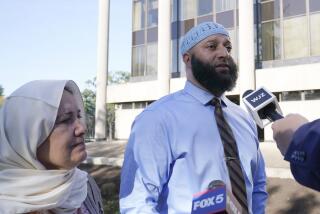Bird Court Ruling Ordering Parole for ‘Onion Field’ Killer Is Reversed
- Share via
SAN FRANCISCO — The state Supreme Court ruled Monday that Gregory Ulas Powell must remain in prison for the 1963 murder of a Los Angeles police officer that later drew nationwide attention in a best-selling book and movie called “The Onion Field.”
The court, reversing a controversial ruling made under former Chief Justice Rose Elizabeth Bird, held 6 to 1 that the state Board of Prison Terms properly rescinded Powell’s impending parole in 1982 based on new evidence that his release might endanger public safety.
The justices found that parole authorities have sweeping power to cancel the scheduled release of a prisoner--and that courts cannot intervene so long as there is “some evidence” cancellation is warranted.
Justice Stanley Mosk, writing for the majority, said that it was up to the board to “strike a balance” between the interests of the inmate and the public.
“While the board cannot rescind a parole date arbitrarily or capriciously, it does not abuse its discretion when it has some basis in fact for its decision,” Mosk said.
In a biting dissent, Justice Allen E. Broussard, author of the court’s invalidated 1986 ruling ordering the inmate’s release, contended that there was not even “insubstantial evidence” to cancel Powell’s parole.
“One cannot help but suspect that the board’s decision here is not the product of an impartial adjudication, but an emotional reaction to the prospect of parole for a once- notorious prisoner whose notoriety was revived by the showing of a movie depicting his crimes,” Broussard wrote.
Prosecutors said the ruling not only assures wider power to rescind parole, but also probably makes it easier to revoke an inmate’s “good-time” credit for disciplinary infractions.
“This is a very significant decision,” state Deputy Atty. Gen. Dane R. Gillette said. “We are very pleased, not only because of the specific facts of this case, but because it underscores the broad discretion that is available in making these kind of decisions.”
An attorney for Powell, Karen L. Snell of San Francisco, expressed dismay with the ruling and said it might be appealed to the U.S. Supreme Court. “We believe that had it not been Gregory Ulas Powell who was the subject of today’s decision, the outcome may well have been different.”
Powell, now incarcerated at the California Medical Facility at Vacaville, had been informed of the ruling, “but like his attorneys, was not surprised,” Snell said.
Powell was most recently refused parole in May, 1987, and is now scheduled to appear before officials in May, 1989, to renew a bid for release.
Now 54, Powell and Jimmie Lee Smith were convicted and sentenced to death for the kidnaping and murder of Los Angeles Police Officer Ian Campbell and the wounding of his partner in an onion field near Bakersfield in 1963. Their sentences were later reduced to life in prison.
The crimes and the years of tangled legal proceedings that followed became the subject of a best-selling book, “The Onion Field,” by Joseph Wambaugh that later was made into a movie of the same name.
Scheduled for ’83 Release
Smith was paroled in 1982, and Powell was scheduled to be released 1983. Twice the board reaffirmed his impending release, but before Powell was to go free, the movie was shown on national television and protests arose from public officials, law enforcement officers and the public.
In 1982, the state Board of Prison Terms rescinded its plan to release the convict, citing a new psychiatric report concluding that Powell might still be dangerous and finding that the inmate was ill-prepared to resume life outside prison. The board also said that in previously finding him suitable for parole, it had not adequately considered his several attempts to escape from prison and jail during the late 1960s and early 1970s.
Powell’s attorneys challenged the board’s action in the courts. Finally, the state Supreme Court, in a 4-3 decision, ruled in December, 1986, that Powell was entitled to freedom because the board lacked “substantial evidence” for canceling his parole.
But within a week of the ruling, Bird and two other justices who had joined in the majority left office after their defeat in the general election. About three months later, three new court appointees of Gov. George Deukmejian joined with the three previous dissenters to grant a request by state Atty. Gen. John K. Van de Kamp for a rehearing in the case.
In Monday’s ruling, Mosk reaffirmed that while “public outcry” could trigger reconsideration of an impending parole, it could not serve as the basis to rescind parole.
But the court went on to reject the conclusion reached in the 1986 decision that there must be “substantial evidence” to warrant rescission. Rulings by the U.S. Supreme Court and the California courts indicate that parole authorities have broad discretion--and that their actions need be supported only by some valid evidence, the justices said.
More to Read
Sign up for Essential California
The most important California stories and recommendations in your inbox every morning.
You may occasionally receive promotional content from the Los Angeles Times.













